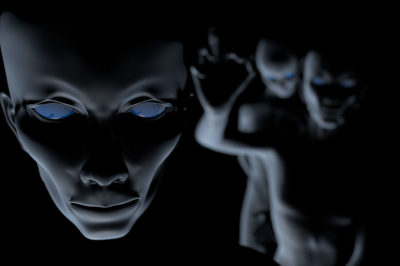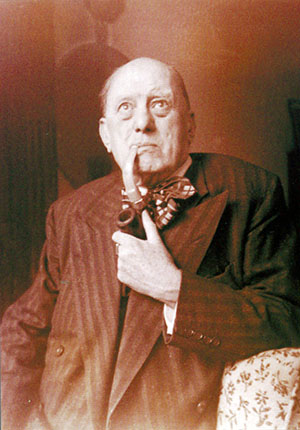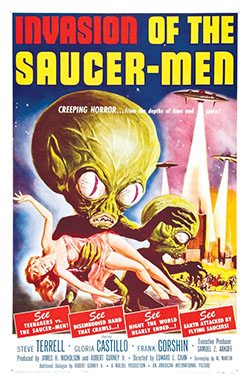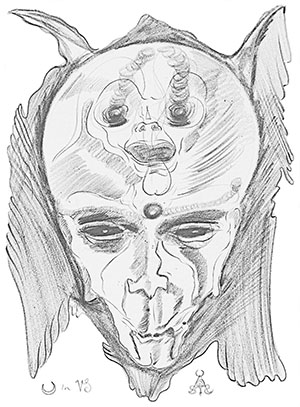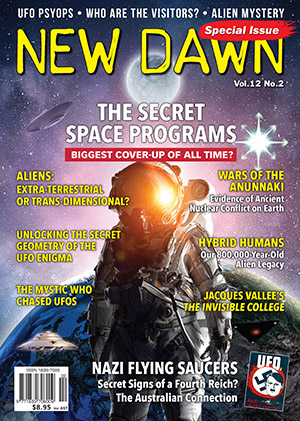From New Dawn Special Issue Vol 12 No 2 (April 2018)
Are aliens extra-terrestrial? Ufologists, contactees and abductees presume that they are. This presumption is based on the theory that alien-astronauts visited the Earth in ancient times to establish off-world colonies and engineer the process of human evolution. Since the aliens supposedly come from worlds other than our own, or so the theory goes, it follows they must be extra-terrestrial.
However, there is little evidence for believing this. To date, not a single ufologist, contactee or abductee can present credible evidence to support the view that aliens are extra-terrestrial. Evidence of a kind, however, does exist for an alternate theory about the ontological nature of alien entities. This is the view that aliens are trans-dimensional entities inhabiting the myriad layers of alternate dimensions that interpenetrate the Multiverse, ‘in’ the world as we know it and yet not really ‘of’ the world.
The great 20th century magickal practitioner Aleister Crowley, in his own experiments, first postulated this view; he saw aliens, in fact, as humanity’s best chance for solving the problems of life, death, and achieving perfection. Similarly, Crowley’s disciple and protégé, Kenneth Grant, head of the UK branch of the OTO for many years and author of the monumental 9-volume Typhonian Trilogies series, also made the argument that aliens are trans-dimensional. Grant went a bit further than Crowley due to the fact that the UFO craze was gathering steam when Grant was starting his own career (Grant’s Typhonian New Isis Lodge was in active operation between the years 1955–1962). Studying the documents of the early contactees such as George Adamski, Betty and Barney Hill, and Howard Menger, Grant attempted to reconcile ufology, which he referred to as “ufologicks,” with mainstream occult theory & practice.
Aleister Crowley & LAM
Aleister Crowley (1875–1945), poet, mountaineer, adventurer & philanderer, worked his way through most of the grade structure of the Hermetic Order of the Golden Dawn in the early 1900s, learning the theory and practice of Western magick from the bottom up. When the order was wracked with schism, Crowley left and founded his own more congenial magickal order, the Argenteum Astrum. Later, in 1912, Crowley became the Grand Master of the Ordo Templi Orientis (OTO) in the UK, where he developed his special, stylised brand of sex magick based on Tantric and Yezidis sources.
Crowley defined magick as “the science and art of causing Change to occur in conformity with Will.” The “change” Crowley refers to is psychological and spiritual transformation. This is accomplished by utilising the latent, psychic powers of the mind and activating the psycho-sexual power zones that reside in key areas of the body and the brain, the areas known as the chakras. As a necessary preliminary step towards making the “magick” happen, so to speak, the magickal practitioner must achieve contact with a genuine alien entity, something not connected to the practitioner’s own mind or body. Crowley referred to this entity by the rather fanciful name “Holy Guardian Angel” (HGA), and he described the experience of contacting the HGA somewhat less fancifully as obtaining “Knowledge & Conversation.” Crowley insisted that contact with the HGA was absolutely required before the magickal practitioner could hope to utilise the powers and energies of lesser entities such as spirits, elementals, demons and so forth (none of which, it must be remembered, can be wholly disassociated from the mind of the practitioner). And finally, Crowley insisted that each and every person on Earth must achieve contact with his or her own HGA if humankind is expected to advance. As Crowley writes:
My observation of the Universe convinces me that there are beings of intelligence and power of a far higher quality than anything we can conceive of as human; that they are not necessarily based on the cerebral and nervous structures that we know; and that the one and only chance for mankind to advance as a whole is for individuals to make contact with such Beings.
This is one of the most important passages that Crowley ever wrote. Crowley offers a three-fold definition of an alien entity: (1) aliens are genuinely ‘alien’ since they exist apart from the physical and cerebral attributes of human beings; (2) aliens have a higher level of intellectual and cognitive ability than humans; and, most importantly, (3) aliens, being essentially magickal beings, are trans-dimensional, not extra-terrestrial. This last point is implicit in Crowley’s statement but it is there nonetheless. The magickal practitioner is expected to achieve the knowledge and conversation of the HGA via magickal or mystical methods; this entity can be summoned by magickal rites, whether evocations or invocations; it can be summoned by astral travelling or lucid dreaming; or the entity can be summoned in meditation and/or mystical trance. In contrast, extra-terrestrial entities cannot be reached by using any of these methods – they must be met face-to-face in real time, in a common, shared time-space continuum.
In his lifetime Crowley achieved contact with only one alien entity of this nature, and that was the alien known as Lam or Aiwaz (the two are sometimes distinguished by occult scholars, but they were virtually synonymous in Crowley’s mind and I shall therefore speak of them as one entity in this essay). Lam was believed by Crowley to be an emissary of other aliens or “outer-ones”; Lam/Aiwaz was the entity that dictated the notorious Book of the Law, or Liber AL, to Crowley via the seer Rose Kelley in 1904. Crowley also had direct contact with Lam in America later in 1915 and 1919. Crowley drew a portrait of Lam and included it with some of his expressionist paintings in an exhibition held in Greenwich Village, New York City, 1919. This drawing was reproduced for the first time in The Equinox, Vol. III, No. 1 (1972); Kenneth Grant reproduced the same drawing in The Magical Revival (1972) and Outside the Circles of Time (1980). Lam has a small, diminutive body visible only from the chest on up, covered by a coarse, wool-textured robe. The area of the head above the eyebrows and the bridge of the nose is very high, bulbous and hairless; it is more than twice as long as the lower area. There is a faint, mushroom-cloud shape etched into the expansive forehead. The face itself is scrunched down low between the eyebrows and the chin; the eyes are narrow and slanted, the pupils tiny, the nose long, the mouth a mere slit.
When we compare the image of Lam with the descriptions of aliens given by contactees and abductees, there are striking similarities. Grey-skinned humanoids have been reported as being 3-4 feet tall with bald, elongated heads, black almond eyes and slits for mouths. There are descriptions of diminutive green humanoids, also bald with elongated heads, slanted eyes, slit-mouths. There are even accounts of small silvery creatures who resemble the other two types. Clearly, contactees and abductees are seeing the same sorts of entities that Crowley saw; the only difference is that Crowley’s entity was not coloured green, gray or silver. In this context, it is worth noting that all of these alien archetypes are virtually equivalent to the 1950s Hollywood Science Fiction versions of aliens – the big-brained, bug-eyed, little green or gray men that still crop up occasionally in SF films on TV and in the cinema today.
David J Skal, horror film scholar and author of The Monster Show: A Cultural History of Horror (1993), offers an interesting interpretation of the big-headed, bug-eyed alien stereotype.
Invasion of the Saucer Men (1957) boasted the most exaggerated eye-brain hypertrophy of all: aliens (played by dwarves) with heads shaped like gargantuan light bulbs, their bugging eyes the size of baseballs…. these new creatures anticipated not the violent rending of the body but its withering and atrophy. The future was about watching images and processing information; the eyes and brain were the only useful parts of the human form left…. ocular anxiety and depersonalization was reflected in films like The Beast with a Million Eyes (1955), The Crawling Eye (1958), and The Cyclops (1957).
This is eerily applicable to our contemporary times where young millennials are addicted to their smartphones, cherishing them more, seemingly, than the hands that hold them, as they pump unceasing bits of social and entertainment data directly into their brains. Perhaps in the future, as our technologies advance and proliferate, we will see increasing levels of “ocular anxiety” and depersonalisation of the type mentioned by Skal. But this is more or less a human thing. Alien entities such as Lam do not have big heads because of information overload; they need the expanded cranial capacity to house their superior minds and apply their cognitive energy, enhanced as it is, to assist humankind in taking the next, necessary step towards enlightenment.
Kenneth Grant & Ufologicks
After Crowley’s death, his disciple Kenneth Grant (1924–2011) received a charter from Karl Germer, Crowley’s successor as Outer Head of the OTO, to set up a UK branch of the OTO. From its inception, Grant’s New Isis Lodge reflected Crowley’s hopes, which he articulated in his diaries during the last two years of his life, for a fundamentally different, re-structured OTO, focused less on initiation and more on promoting and fostering communication with alien entities.
Elaborate ceremonial and the establishment of fixed Lodges in specific locales would be superseded by a fluid and far-flung web comprised of Thelemic power-zones. These power-zones would form a loosely-knit network of occult groups using the Ophidian Current to prepare human consciousness for intercourse with the denizens of other dimensions.
Grant followed through on Crowley’s game-plan; he divided his “Typhonian” OTO as he called it into a series of disparate cells, each operated by either a single, dedicated magickal practitioner or by a small coven of practitioners. The main lodge facility was reserved for visiting magickal practitioners and performance artists who were allowed to stage their own creative rites on a first-come, first-serve basis, using lodge members occasionally for support and backup.
Grant, like Crowley, also contacted the HGA. Grant’s guardian angel was named Aossic-Aiwass, and not surprisingly it closely resembled LAM. Grant provides plates in the various volumes of his Typhonian Trilogies series that show the faces of the alien entities he communicated with over the course of his magickal experiments, both during his tenure as head of the New Isis Lodge and afterwards. These aliens also resemble Lam. An alien known only as Desmodus is shown in Plate 8 of Outer Gateways (1994); this was drawn by Grant. Desmodus’ face occupies only the lower half of the head; the rest is a high, bulbous forehead, with a small, weird face etched into the skin, smoke pouring out of its eyes. In Plate 29 of Beyond the Mauve Zone (1999) there is the drawing (also by Grant) of an alien priest. Like Aossic-Aiwass, the priest has a large, bulbous head, though the face is more normal looking. These examples are clear evidence the alien entities that haunted Grant’s magickal chambers and the chambers of his imagination are the same diminutive, big-brained creatures that appear to countless contactees and abductees.
Grant, likewise, accepted Crowley’s view that alien entities are trans-dimensional. In Outside the Circles of Time (1980), Grant calls into question the whole extra-terrestrial vs trans-dimensional dichotomy, seeing outer space as a form of inner space, especially when it comes to alien beings. This takes aliens out of their metal ships and plants them squarely in alternate dimensions.
Whether or not…. intrusion proceeds from actual entities in outer space is problematic; outer space may be another form of that inner space which comprises the mental or subjective universe.
In a later, more penetrating analysis of the nature of aliens, in his Outer Gateways (1994), Grant rightly notes that the larger percentage of encounters involve aliens that are not flesh and blood but are actually magickal beings. Grant theorises that aliens are largely “etheric,” not quite astral-entities but closer in substance to the astral than they are to the physical. Grant extends this theory to include alien ships. These ships, according to Grant, are etheric – astral shells or capsules fabricated by the trans-dimensional aliens as a necessary by-product to assist in reification on the physical plane.
The substance of manifestation appears ….to be of an etheric as distinct from an astral nature. This supposition is suggested by the tangible quality of many of the objects observed. Sightings in this category appear to be far in excess of those in which the occupants of UFO’s are considered to be flesh-and-blood beings… that suggests that ufonauts are of a substance more subtle than their vehicles, as the astral body of man is more subtle, or less dense, than his physical body. Such might be the case, for example, if an astral entity fabricated for itself an etheric shell, or capsule, as in the practice known as the magickal assumption of god-forms.
Grant coined the term “ufologicks,” which is phonetically similar to “magicks.” He defined ufologicks in obscure terms as “a suggested designation for the mantric vibrations associated with Gematria and with the power-wave impinging upon earth from Outside.” When we get past the over-inflated terminology, the meaning is rather simple: ufologicks is (or will be) a new magickal system focused primarily on rites that are specifically designed to enable magickal practitioners to contact alien entities like Lam, Aossic-Aiwass, or Desmodus.
Unfortunately, Grant died before he could take practical steps to implement this new system. But he did leave behind some notes on an improvised magickal rite which could be used to summon Lam. Grant instructs the magickal practitioner to gaze at the portrait of Lam, concentrating attention on the eyes. As concentration deepens, the eyes will start to enlarge, and they will suck you into the portrait so that you have the sensation of being inside the entity’s head. Then, Grant tells us, two paths are possible, either a “downward” or an “upward” path. Grant doesn’t elaborate on what might occur if the upward path is chosen, but he is very explicit about the downward option. The results are quite dramatic, and they deserve full quotation here.
If downward, the descent will be accompanied by a sensation of rushing air… A deep blackness will engulf the mind as one enters the dark tunnel beneath the mouth of Lam, and the wind will be replaced by the sound of rushing waters… [this] will awaken the image of an octopoid entity, the tentacles of which are the branchings of the tunnel below the mouth of Lam…. [A] fusion will occur between the eyes of Lam, in the region of the ajna chakra, and the flame will shoot aloft into the vast brilliance of a cranium that appears infinite in extent and dazzlingly lustrous.
This rite serves as an excellent example of what the formal rites for a ufologick lodge might have looked like if Grant had lived to establish his proposed magickal system.
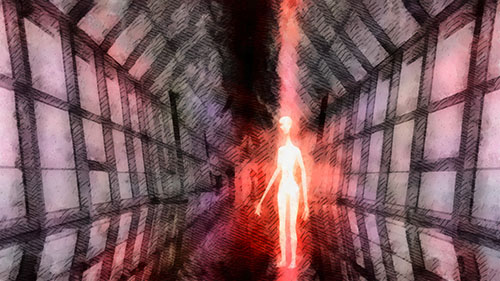
As a parting concession to future ufologists, there is a curious and rather peculiar UFO-centric account of the creation of the world in one of Grant’s last books, Beyond the Mauve Zone (1999). Grant describes the appearance of an alien astronaut on Earth in ancient, pre-human times (the period is not specified). The alien presents itself in the guise of an eccentric, reclusive scientist. In his laboratory, the alien has set up a shrine to the goddess Nu-Isis, consisting of a statue of the goddess and an eternal flame burning in front of it. The statue is fashioned from a metal that cannot be found on Earth. She is a metallic, biomechanoid Earth-woman, reminiscent of the countless biomechanoid female aliens that proliferate in the canvasses of the Swiss artist H. R. Giger. The alien scientist feeds the statue with fluids drawn from elemental, astral entities. Eventually, the laboratory is destroyed by a massive explosion and the alien either perishes or escapes back to his own dimension. Much later a living human woman emerges from the ashes of the lab, born from the apocalypse of the explosion. She is Lura, daughter of the biomechanoid statue, who Grant describes as “the vitalised image worshipped and nourished by the scientist in the secrecy of his laboratory.” Along with the birth of Lura, humans begin to populate the Earth. Some of these humans are directly descended from Lura herself, the children of her sexual liaisons with Earth men, and these individuals are particularly suited to communicate with trans-dimensional alien entities. At the present day, the descendants of Lura are the magickal practitioners – magickians, mystics and psychonauts – who seek supra-human knowledge and power.
Real or Not Real?
Previously, I mentioned there is scant empirical evidence for the existence of aliens. This is especially true when it comes to the extra-terrestrial alien. In all fairness, it must be noted that the evidence for the existence of the trans-dimensional alien is equally weak. We have examined the testimony of Crowley and Grant, but is this any more reliable than the testimony of ufologists, contactees or abductees? The issue here boils down to the distinction between the imaginary world and the so-called ‘real’ world. Which is true? Or are both true? Or neither? In the last few decades, quantum physics has eroded our views about reality, and the theories of contemporary scientists are beginning to sound a lot like the theories of the magickal practitioners, both past and present. The line between what is real and what is not is no longer distinct, and in the absence of certainty we are free to believe what we will.
In this regard, I am reminded of Harry Potter’s final meeting with his mentor Albus Dumbledore near the end of the 7th book in J. K. Rowling’s Harry Potter series, Harry Potter and the Deathly Hallows (2007). Potter finds himself in an alternate dimension that looks like King’s Cross station, except that it is empty – no trains, no passengers and full of bright mist. Initially, Potter is surprised to see Dumbledore, because Dumbledore died in the previous book. After they converse, Potter asks Dumbledore: “Is this real? Or has this been happening inside my head?”, to which Dumbledore replies: “Of course it is happening inside your head… but why on earth should that mean that it is not real?”
© New Dawn Magazine and the respective author.
For our reproduction notice, click here.

